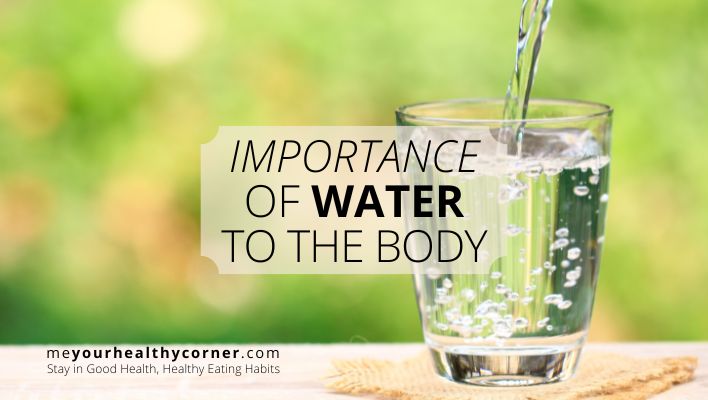I’m going to start off by painting a clear picture of why hydration should be at the forefront of our daily health rituals. This isn’t just about quenching your thirst. In fact, it’s also about the foundational role that water plays in maintaining your body’s vitality. You’re going to find out about how good hydration habits are not a luxury, but a necessity for your body to function optimally.
Keep in mind that understanding the why’s and how’s of hydration will help you to decide the correct approach in maintaining your health. It’s important to develop a respect for the humble glass of water—after all, it’s not just a drink, it’s the essence of life itself. And that leads us to find out the reasons why water is so important. Read on.
Why Water is Important for the Body

You need to understand why water isn’t just another beverage option. It’s the bedrock of our very existence. Every cell, tissue, and organ in your body needs water to work properly. It’s fundamental for maintaining the health of every part of you, from your brain to your toes.
Think about it. Water makes up about 60% of your body weight. That’s because it plays a key role in a myriad of bodily functions.
Water is involved in everything from serving as a building block for cells to facilitating chemical reactions that keep you alive.
Beyond just keeping your cells plump and happy, water also acts as a shock absorber for your brain and spinal cord. Also, it lubricates your joints, and it helps keep your temperature steady by sweating and respiration.
Did you know that water is the vehicle for carrying essential nutrients to where they need to go? That’s right – without adequate water, your cells would be like marooned sailors, unable to receive supplies to survive and thrive. Hydration allows your body to absorb and transport vitamins, minerals, and other substances efficiently.
Now, what about waste? Your body is constantly producing waste products as byproducts of metabolic processes. Hydration is the ticket out for those waste products. Adequate water consumption helps dissolve these substances and facilitates their journey out of your body.
The takeaway here is that water’s importance extends into every aspect of your physiological functioning.
Staying Hydrated is Key to Maintaining Health Balance
Hydration is about keeping your body in balance. When you’re properly hydrated, every system in your body works better, from your brain to your muscles to your immune system.
Imagine your body as a high-tech facility, and water is the electricity keeping everything running smoothly. Without enough of it, systems start to falter. Chronic dehydration is like a power outage, and the effects can be far-reaching. Regularly skimping on water could leave you with headaches, fatigue, and even reduced cognitive function.
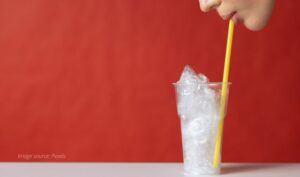
Many of us reach for water when we’re feeling parched. The truth is, if you’re already feeling thirsty, you’re playing catch-up. Preventive hydration keeps these complications at bay and supports critical functions such as digestion, circulation, and temperature regulation.
With every sip of water, you’re helping your body perform at its best. Hydration is the baseline for health, and when it’s overlooked, it can lead to a cascade of health issues. That’s why investing in hydration is investing in your longevity and quality of life.
As we transition to the next section, remember that water doesn’t just support life—it enhances it. Now, let’s take a look at the signs of dehydration.
Recognizing and Responding to Dehydration

Staying hydrated isn’t just about chugging water. Recognizing the signs of dehydration is just as crucial. Your body has its ways of signaling that it’s running low on fluids. You might notice that you’re feeling unusually fatigued, experiencing headaches, or that your mouth feels drier than a desert. These are your body’s warning lights flashing.
Don’t worry too much about memorizing a long list of symptoms. Focus on a few common signs like darker urine, dizziness, and dry skin. If these seem familiar, your body’s telling you to sip some H2O, pronto. Think of water as your body’s trusty sidekick, battling the villainous symptoms of dehydration as soon as they creep up.
Ignoring these signs can put you on a fast track to more serious health issues. We’re talking urinary and kidney problems, seizures, and even hypovolemic shock in extreme cases. But don’t let that scare you—staying hydrated is the best armor against these, and I’m going to talk more below.
Before that, let’s find out how much water you should drink. It’s not one-size-fits-all. Your water needs can depend on your health, your activity level, and even the climate you live in.
How Much Water is Enough?
You’ve probably heard the old saying: ‘Drink eight glasses of water a day.’ But is this tailored to everyone’s needs? The truth is, how much water you should drink can depend on a variety of factors such as age, gender, climate, and activity levels.
For the average adult, experts generally recommend about 2.7 liters (91 ounces) for women and 3.7 liters (125 ounces) for men per day. This includes total water intake from beverages and food.
Keep in mind, though, that if you’re someone who sweats profusely due to exercise, or you live in a hotter climate, your numbers might skew higher.
However, these numbers aren’t a one-stop solution. It’s more constructive to listen to your body. Signs like the color of your urine – aiming for pale yellow – and how often you need a bathroom break can be good hydration indicators.

If you’re thirsty, your body is already signaling for replenishment. Adjust your intake accordingly.
On top of that, paying attention to the impact of environmental factors is important too. Just as a plant needs more water in the scorching heat, your body does too. Increasing your intake during hot weather or when you’re physically active is an adjustment that aligns with your body’s needs.
Now, as you’re ramping up your water intake, you might be thinking, How can I seamlessly blend this into my daily routine? That’s where the next section swoops in. In the following part, I’m going to share some actionable tips that’ll help you stay hydrated without feeling overwhelmed.
5 Essential Tips to Stay Hydrated
If you’re looking to enhance your hydration habits, there are simple yet effective strategies you can employ. It’s not just about drinking water when you remember. It’s about creating a doable routine.
1. Bring along water wherever you go
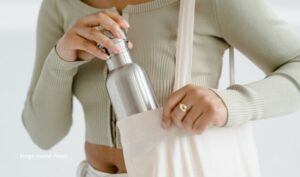
Yes, easy peasy. Carry a reusable water bottle with you wherever you go. This encourages regular sipping.
Investing in a high-quality, BPA-free water bottle makes it convenient to stay hydrated throughout the day, whether you’re at work, running errands, or exercising.
My children and I carry our own water bottle even to shopping malls. A small one that fits into our bags.
2. Consider the power of water-rich foods
Foods like cucumbers, tomatoes, and watermelons aren’t just snacks, they’re hydration heroes. Each bite contributes to your daily fluid intake, plus they’re packed with nutrients.
3. Set a regular water intake schedule
This can work wonders.
You might start your day with a glass of water and then drink at regular intervals. A very good example is to drink after going to the toilet. Or before, and this is good for bowel movement.
If you’re someone who forgets to sip throughout the day, replacing a forgetful habit with a structured one can make all the difference.
4. Use technology and tools
There are apps that remind you to drink water. Really! Apps like WaterMinder or Hydro Coach can help you stay on track by sending notifications to remind you to drink water at regular intervals.
Have you heard of smart water bottle that reminds you to drink water? I was surprised by this and if you wish to check this out, here’s a list of Smart Water Bottles on Amazon (Affiliate Link*).
HIDRATE SPARK PRO Smart Water Bottle – Insulated Stainless Steel – Tracks Water Intake with Bluetooth, LED Glow Reminder When You Need to Drink – Straw Lid, 21 oz
The LED smart sensor puck glows to remind you when it’s time to drink and tracks your water intake via Bluetooth on the free iOS & Android app.
ULLA Smart Light for Water Bottle, Small Hydrate Reminder, Fits Most Water Bottles, Lights Up when Time to Drink, Hydration Intake Planner, Home & Office Use, BPA Free
This is the world’s first hydration reminder water bottle attachment! It can be seamlessly moved from bottle to bottle and uses smart detection sensors to remind you to drink water at least once per hour.
BUILDLIFE 1 Gallon Water Bottle with Time Marker and Straw –Large Water Bottle- Motivational Water Bottles with Times to Drink, Leak Proof BPA Free Gallon Water Jug for Sports,Gym
Without the use of mobile phone apps, this practical water bottle features a unique time marker on the exterior, which can help you monitor your daily water intake effortlessly.
*I receive a small commission at no extra cost to you. This allows me to enjoy a cup of coffee while writing and sharing more articles like this one.
Choose something that you’re comfortable with, whether it’s high-tech or as simple as a timed water bottle.
5. Fruits or herbs infused water
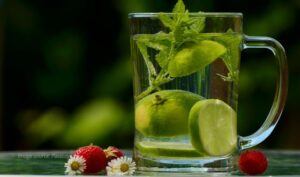
I get it. Some of you may find drinking plain water bland and boring.
What you can do to is infuse your water with fresh fruits or herbs for a burst of flavor and added nutrients.
Experiment with different combinations like cucumber and mint, lemon and ginger, or berries and basil to create delicious and refreshing infused water.
Read more about Infused Water.
Remember, your first attempt at improving hydration doesn’t need to be your last. Adjust your approach as needed, and don’t worry too much about perfection. A well-hydrated body is more resilient, energized, and prepared to face the demands of daily life. I really hope that you use these tips and let the benefits of good hydration improve your everyday health!
Hydration and Caffeine

Being a coffee lover myself, I like to briefly talk about this. And if you love drinking coffee too, read this.
While water should be your primary source of hydration, it’s worth mentioning the relationship between hydration and caffeine. Caffeinated beverages like coffee and tea can contribute to your daily fluid intake, but they also have diuretic effects, meaning they can increase urine production and potentially lead to dehydration if consumed in excess.
Moderation is key. Enjoy your morning cup of coffee, but balance it out with plenty of water throughout the day.
According to a study published in the National Library of Medicine, consuming caffeine in moderation is unlikely to cause dehydration, but it’s essential to maintain adequate fluid intake alongside caffeinated beverages to support overall hydration.
Related read: Is Caffeine Good for Health. Or Bad.
In a Nutshell
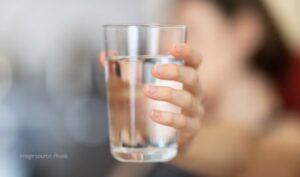
In my opinion, too many people overlook the significance of staying properly hydrated. It’s easy to get caught up in the hustle of life and forget to take a sip of water. You ought to know the consequences of neglecting this simple act can be far-reaching. From physical performance to cognitive function, hydration touches on every aspect of your well-being.
Remember! Staying hydrated is a simple yet powerful way to support your day-to-day health and overall well-being. By making hydration a priority and following these practical tips, you can keep your body functioning at its best, day in and day out.
Knowing why water is important for the body will spur you to drink more water. Yes? No?
What do you think of my tips to stay hydrated? Doable for you? Or you have a routine already in place? Tell us, leave your comments below.
Thank you for reading and please SHARE this article with anyone you think may find this information useful. Click the share button!
Other informational posts you may like to read
Here’s to staying refreshed, revitalized, and ready to tackle whatever life throws your way!
Till next post, take good care!
Me YourHealthy Corner – Stay in good health, healthy eating habits
Disclosure: This blog post may contain affiliate links as part of the Amazon.com Services LLC Associate Programs and other affiliate services. This means that meyourhealthycorner.com receives a small commission by linking to amazon.com and other sites at no extra cost to the readers.
Medical Disclaimer: I am not a doctor or medical professional, and this post should not be taken as medical advice. Please do your own research. The material on this blog is provided for informational purposes only. It is general information that may not apply to you as an individual and is not a substitute for your own doctor’s medical care or advice.

